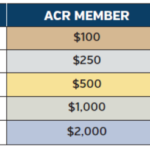Howard Blumstein, MD, Rheumatology Associates of Long Island, Smithtown, N.Y., is the new chair of RheumPAC, the ACR’s nonpartisan political action committee (PAC). The Rheumatologist (TR) spoke with him about why advocacy matters in the field of rheumatology and more.

Dr. Blumstein
TR: Tell us about yourself. How did you get into rheumatology and why?
Dr. Blumstein: I am a clinical rheumatologist in private practice on Long Island. I joined my 12-person rheumatology practice after completing my fellowship in 2005. I got into rheumatology for a variety of reasons. My primary mentors in medical school and my residency were rheumatologists. Additionally, my grandmother had rheumatoid arthritis and would often talk about her rheumatologist, who put her into a remission [period] years ago with gold [therapy]. She would always say he saved her life. I think that planted a seed.
TR: How did you get involved in advocacy work?
Dr. Blumstein: Max Hamburger, MD, FACP, the managing partner of our practice, founded the New York State Rheumatology Society in 2004. Fairly early in my career, he offered me the opportunity to sit in as a liaison for the ACR’s Affiliate Society Council, which is dedicated to supporting state and local rheumatology societies, including society formation and meeting resources, as well as advocacy at the state level. He and the other partners in the practice always encouraged my efforts.
I then started regularly attending the ACR’s annual fly-ins, where doctors, other health professionals and patients go to Washington, D.C., learn about important issues affecting the rheumatology community and then head to Capitol Hill to educate legislative staffers about the various topics that impact our patients and our practices.
Eventually, I had the opportunity to serve as the president of the New York State Rheumatology Society. We developed an advocacy day for our state and partnered with the ACR, the Arthritis Foundation and the Coalition of State Rheumatology Organizations. We went to Albany [one day a year] for several years, until the pandemic. I have also volunteered on a variety of committees at the ACR, including the Government Affairs Committee and, most recently, RheumPAC.
TR: Why is RheumPAC important?
Dr. Blumstein: RheumPAC provides the critical financial support for the ACR’s advocacy efforts at the federal level. The College’s advocacy efforts focus on educating legislators and their staff on the importance of research funding for rheumatic diseases, funding for training spots and also policies that will allow private practices as well as academic practices to stay afloat. These are bipartisan efforts. I see the primary role of RheumPAC to develop innovative ways to encourage other members of the ACR to see how vital these activities are to the success of our profession.
I also want to spread the message of what advocacy is and what it isn’t. Advocacy is not about bribery. There’s nothing dirty about advocating for your patients and the future of your profession in terms of workforce, therapeutic advances and the financial viability of our practices. It’s our duty to do this, and we’re really supporting legislators who already support us by helping to keep them in office.
TR: What are your goals for RheumPAC?
Dr. Blumstein: Primarily I want to develop innovative ways to engage the rest of the College. Zach Wallace, MD, MSc, our outgoing chair, has done a phenomenal job in terms of outreach and networking with other members. I’d like to find more ways to connect better with our academic colleagues and training programs. We have trainees going out into the world, and regardless of what career path they take, they’re going to be impacted by policy. They don’t necessarily have to go to Washington, D.C., but giving even $10—multiplied by the number of members in our College—will make a difference, especially if it’s consistent.

The Blumstein family
TR: Anything else you would like to share to help members get to know you?
Dr. Blumstein: Our family adopted our first-ever dog, Brad, at the beginning of the pandemic. He’s a 65 lb. Husky/Border Collie/beagle/Chow Chow/Bulldog mix. Last month we added Piper, a Chihuahua/terrier mix to our family. Both are from rescues. I have always wanted a dog, and we are all so happy with them.
Renée Bacher is a health and medical writer based in Louisiana.
